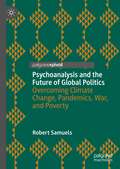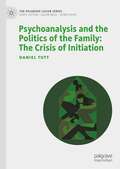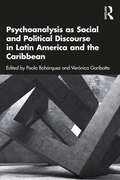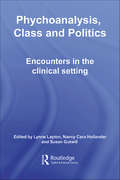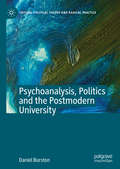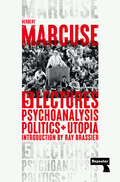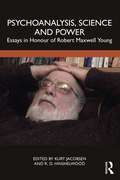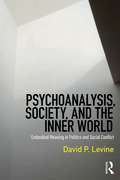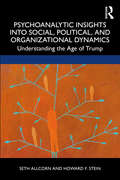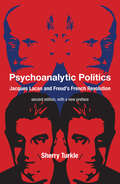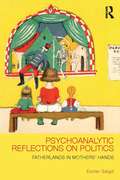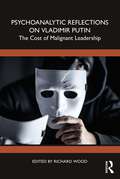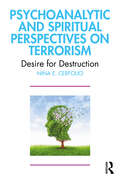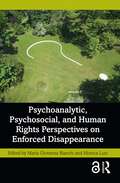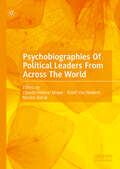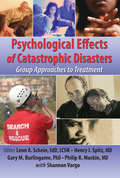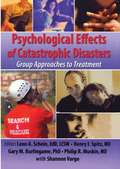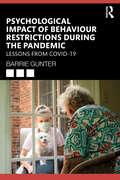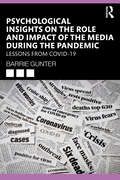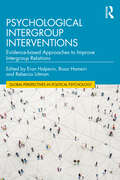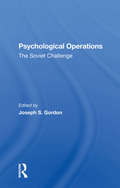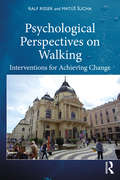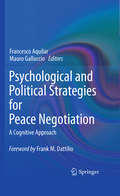- Table View
- List View
Psychoanalysis and the Future of Global Politics: Overcoming Climate Change, Pandemics, War, and Poverty
by Robert SamuelsThis book offers a unique approach by using psychoanalytic theory to explain how we can resolve the most important issues facing the world today and in the future. One of my main arguments is that we need to move beyond national politics in order to provide global solutions to global problems. However, there is a misplaced fear concerning global governance, and much of this phobia is derived from a misunderstanding of history and human psychology. Not only do we have to learn to give up our idealized investment in nations and nationalism, but we also have to move beyond seeing the world from the perspective of a victim fantasy. Since we often repress real signs of global progress, we experience the global present and the future in negative ways. To reverse this perspective, we need to first understand the incredible progress humans have made in the last two hundred years, but we also should not ignore the real threats we face.
Psychoanalysis and the Politics of the Family: The Crisis of Initiation (The Palgrave Lacan Series)
by Daniel TuttPsychoanalysis and the Politics of Family aims to raise a sophisticated and highly accessible debate around the family, self-making and the political and cultural implications of liberation. The text proposes a new way to read the Lacanian theory of Oedipus and through this reading resituate a series of important political and theoretical debates that have concerned intellectual life over the last forty years. It is written with an accessible style so that both specialists in Lacanian and Marxist theory and a broader cross-section of readers interested in understanding the implications of debates across populist and Marxist perspectives that have occupied the global left since the 2008 economic crash. The text aims to resituate the way theories of emancipation and liberation are theorized from a distinctive psychoanalytic and Lacanian point of view. In resituating the infamous “Oedipus complex” in a new light, the text re-opens a series of debates with important theoretical interlocutors, including the influential American historian and psychoanalytic thinker Christopher Lasch, whose thought has witnessed a significant renaissance of interest today, to the staunch critic of Freud and Lacan, René Girard, to Gilles Deleuze and Félix Guattari and their widely read Anti-Oedipus series that disputes the Freudian and Lacanian notions of Oedipus.
Psychoanalysis as Social and Political Discourse in Latin America and the Caribbean
by Verónica Garibotto Paola BohórquezThis book offers a regional, intersectional, and transnational perspective of psychoanalysis in Latin America and the Caribbean that illuminates psychoanalysis's role as social and political discourse through a collection of original interventions in the fields of psychoanalysis, cultural studies, psychology, anthropology, health sciences, history, and philosophy. The authors contribute to discussions about the applicability of psychoanalytic concepts to reading Latin American and Caribbean sociopolitical phenomona as well as how these regionally specific dimensions challenge and transform traditional psychoanalytic notions. Firstly, the book offers a regional overview of psychoanalysis as a discourse that reflects on the imbrication between the psychic and the sociopolitical. Secondly, it showcases intersectional perspectives that illuminate psychoanalysis's potentials and limitations in addressing contemporary problematics around race, gender, sexuality, and class. Finally, the book attests to the area's role in advancing psychoanalysis as a transnational discipline. By providing both a balanced regional overview and an interdisciplinary perspective, the volume will be essential for all psychoanalysts and scholars wanting to undersrand the place of psychoanalysis in Latin American and Caribbean discourse.
Psychoanalysis in the Age of Totalitarianism (The New Library of Psychoanalysis 'Beyond the Couch' Series)
by Matt Ffytche Daniel PickPsychoanalysis in the Age of Totalitarianism provides rich new insights into the history of political thought and clinical knowledge. In these chapters, internationally renowned historians and cultural theorists discuss landmark debates about the uses and abuses of ‘the talking cure’ and map the diverse psychologies and therapeutic practices that have featured in and against tyrannical, modern regimes. These essays show both how the Freudian movement responded to and was transformed by the rise of fascism and communism, the Second World War, and the Cold War, and how powerful new ideas about aggression, destructiveness, control, obedience and psychological freedom were taken up in the investigation of politics. They identify important intersections between clinical debate, political analysis, and theories of minds and groups, and trace influential ideas about totalitarianism that took root in modern culture after 1918, and still resonate in the twenty-first century. At the same time, they suggest how the emergent discourses of ‘totalitarian’ society were permeated by visions of the unconscious. Topics include: the psychoanalytic theorizations of anti-Semitism; the psychological origins and impact of Nazism; the post-war struggle to rebuild liberal democracy; state-funded experiments in mind control in Cold War America; coercive ‘re-education’ programmes in Eastern Europe, and the role of psychoanalysis in the politics of decolonization. A concluding trio of chapters argues, in various ways, for the continuing relevance of psychoanalysis, and of these mid-century debates over the psychology of power, submission and freedom in modern mass society. Psychoanalysis in the Age of Totalitarianism will prove compelling for both specialists and readers with a general interest in modern psychology, politics, culture and society, and in psychoanalysis. The material is relevant for academics and post-graduate students in the human, social and political sciences, the clinical professions, the historical profession and the humanities more widely.
Psychoanalysis, Class and Politics: Encounters in the Clinical Setting
by Nancy Caro Hollander Lynne Layton Susan GutwillDo political concerns belong in psychodynamic treatment? How do class and politics shape the unconscious? The effects of an increasingly polarized, insecure and threatening world mean that the ideologically enforced split between the political order and personal life is becoming difficult to sustain. This book explores the impact of the social and political domains at the individual level. The contributions included in this volume describe how issues of class and politics, and the intense emotions they engender, emerge in the clinical setting and how psychotherapists can respectfully address them rather than deny their significance. They demonstrate how clinicians need to take into account the complex convergences between psychic and social reality in the clinical setting in order to help their patients understand the anxiety, fear, insecurity and anger caused by the complex relations of class and power. This examination of the psychodynamics of terror and aggression and the unconscious defences employed to deny reality offers powerful insights into the microscopic unconscious ways that ideology is enacted and lived. Psychoanalysis, Class and Politics will be of interest to all mental health professionals interested in improving their understanding of the ideological factors that impede or facilitate critical and engaged citizenship. It has a valuable contribution to make to the psychoanalytic enterprise, as well as to related scholarly and professional disciplines.
Psychoanalysis, Politics and the Postmodern University (Critical Political Theory and Radical Practice)
by Daniel BurstonCritical theory draws on Marxism, psychoanalysis, postmodern and poststructuralist theorists. Marxism and psychoanalysis are rooted in the Enlightenment project, while postmodernism and poststructuralism are more indebted to Nietzsche, whose philosophy is rooted in anti-Enlightenment ideas and ideals. Marxism and psychoanalysis contributed mightily to our understanding of fascism and authoritarianism, but were distorted and disfigured by authoritarian tendencies and practices in turn. This book, written for clinicians and social scientists, explores these overarching themes, focusing on the reception of Freud in America, the authoritarian personality and American politics, Lacan’s “return to Freud,” Jordan Peterson and the Crisis of the Liberal Arts, and the anti-psychiatry movement.
Psychoanalysis, Politics, and Utopia: Five Lectures
by Herbert MarcuseAn impassioned plea for overcoming capitalism, whose urgency is more timely today than when it was first published fifty years ago.Back in print after fifty years and with a new introduction by Ray Brassier, this often overlooked but prescient collection of Marcuse's lectures makes an impassioned plea for the overthrowing of capitalism.Analysing the work of Freud and Marx, and taking in topics like automation, work, postcapitalism, utopia, and technology, Psychoanalysis, Politics, and Utopia excavates the psychic roots of the current crisis of capitalist civilisation, and gives us a blueprint for the emancipation of humanity from the toils of capitalism.In a world reeling from the ongoing collapse of the neoliberal consensus, coupled with the accelerating pace of catastrophic climate change wrought by capitalism, Marcuse&’s radical insights in Psychoanalysis, Politics, and Utopia are as urgently relevant today as they were in 1970.
Psychoanalysis, Science and Power: Essays in Honour of Robert Maxwell Young
by Kurt Jacobsen R. D. HinshelwoodPsychoanalysis, Science and Power reexamines the current state of psychoanalysis and science and technology studies as they have been influenced by Robert Maxwell Young’s work. Robert Maxwell Young, a Texas émigré to Britain, was a scholar, publisher, TV documentarian, psychoanalytic psychotherapist, journal editor, conference organizer and political activist. Young urged that psychoanalysis, particularly in its Kleinian incarnation, illuminated new aspects of science and technology studies, and vice versa. This volume not only provides an overview of Young’s life and interests by a stellar cast of scholars and practitioners but also commemorates the many and intersecting streams of his contributions, reasoning for their continuing relevance in the contemporary studies of psychoanalysis, biological sciences, technology and Darwinian thought. Presenting perspectives that are rigorously analytical and yet often poignant, Psychoanalysis, Science and Power will be an important read for students, analysts and analytic therapists of all orientations who are interested in broadening their understanding of their practice.
Psychoanalysis, Society, and the Inner World: Embedded Meaning in Politics and Social Conflict
by David P. LevinePsychoanalysis, Society, and the Inner World explores ideas from psychoanalysis that can be valuable in understanding social processes and institutions and in particular, how psychoanalytic ideas and methods can help us understand the nature and roots of social and political conflict in the contemporary world. Among the ideas explored in this book, of special importance are the ideas of a core self (Heinz Kohut and Donald Winnicott) and of an internal object world (Melanie Klein, Ronald Fairbairn). David Levine shows how these ideas, and others related to them, offer a framework for understanding how social processes and institutions establish themselves as part of the individual’s inner world, and how imperatives of the inner world influence the shape of those processes and institutions. In exploring the contribution psychoanalytic ideas can make to the study of society, emphasis is placed on post-Freudian trends that emphasize the role of the internalization of relationships as an essential part of the process of shaping the inner world. The book’s main theme is that the roots of social conflict will be found in ambivalence about the value of the self. The individual is driven to ambivalence by factors that exist simultaneously as part of the inner world and the world outside. Social institutions may foster ambivalence about the self or they may not. Importantly, this book distinguishes between institutions on the basis of whether they do or do not foster ambivalence about the self, shedding light on the nature and sources of social conflict. Institutions that foster ambivalence also foster conflict at a societal level that mirrors and is mirrored by conflict over the standing of the self in the inner world. Levine makes extensive use of case material to illuminate and develop his core ideas. Psychoanalysis, Society, and the Inner World will appeal to psychoanalysts and to social scientists interested in psychoanalytic ideas and methods, as well as students studying across these fields who are keen to explore social and political issues.
Psychoanalytic Insights into Social, Political, and Organizational Dynamics: Understanding the Age of Trump
by Seth Allcorn Howard F SteinThis fascinating interdisciplinary work explores U.S. politics since 2015 and offers psychodynamic insights into the unconscious undercurrents of contemporary culture and politics in the United States. Allcorn and Stein expertly lead readers up the steep learning curve of understanding the Trump era by exploring seven key elements of recent political dynamics. Using the complementary psychodynamic models of object relations, Group Relations and Karen Horney’s tripartite theory, this book makes sense of the Age of Trump and its chaotic world of alternate facts, conspiracy theories, reality TV politics, hoax pandemics, and the sweeping chaos of life in the United States. This sense-making relies on two triangulations. The first represents the complex systemic political scene. The second uses three psychoanalytic theories to understand social, political, and organizational dynamics. This book is a key resource for helping readers know and understand ourselves, our fellow citizens, colleagues, family, friends and what Trump and his followers call "them" such as liberals and foreign immigrants, as well as both the larger polarized social and political context in the United States today. The book also provides concrete examples of how these discoveries can be operationalized both in organizations and at the level of national government and leadership. This book is an essential reading for students in organizational behavior including leadership and how governments operate, as well as behavioral health professionals consulting or offering therapy to organizations.
Psychoanalytic Politics, second edition, with a new preface: Jacques Lacan and Freud's French Revolution
by Sherry TurkleAn updated edition of the seminal book that explores why the interest in psychoanalysis in France exploded after 1968 and what it says about culture and therapy.Among Western countries, France may well be the one that resisted Freud the longest. But, in the late 1960s, France was seized by an infatuation with Freudianism. By the end of that decade, France had more than a psychoanalytic movement: it had a widespread and deeply rooted psychoanalytic culture. At the heart of this development was Jacques Lacan's reconstruction of Freudian theory, a reinvention of psychoanalysis that resonated with French culture in the aftermath of the uprisings of 1968. In Psychoanalytic Politics, the second edition of her groundbreaking work, Sherry Turkle tells the fascinating story of Lacan and why his work so profoundly influenced the French psyche. While in the United States psychoanalysis is identified with an essentially conservative medical establishment, the French rediscovery of Freud, in a dramatic enactment of Freud&’s prophesy, became associated with the most radical elements of French philosophical and political life. In this book, Turkle provides a firsthand account of the psychoanalytic culture that developed in France—as a politicized, Gallicized, and poeticized Freudianism, deeply marked by the work of Jacques Lacan. The clearest introduction in English to Lacan's teaching, Psychoanalytic Politics explores how cultures appropriate theories of mind and how ideas come to connect with individuals. The book&’s final chapter provides a fascinating portrayal of the last years of Lacan&’s life—the intrigue and power struggles that resulted in the break-up of the Freudian School he founded and the events that unfolded in the years following his death in 1981.This edition includes a new preface by the author, reflecting on the origins of the book and its relevance for today: a time when the integration of thought and feeling, politics and self-examination is as urgent an endeavor as ever.
Psychoanalytic Reflections on Politics: Fatherlands in mothers' hands
by Eszter SalgóPsychoanalytic Reflections on Politics: Fatherlands in mothers’ hands is a playful exploration of how people’s desires, fantasies, and emotions shape political events and social phenomena. It highlights the mythical sources of today’s political projects, the power of political imagination, and the function of symbolism in political thought. Eszter Salgó argues that the driving force for the formation of political communities is fantasy – ‘illusions’ in a Winnicottian sense, ‘phantasies’ in a Lacanian sense, ‘phantoms’ as described by Nicolas Abraham and Maria Torok, and ‘dreams’ as interpreted by Sándor Ferenczi. She introduces the metaphor of the ‘fantastic family’ as a symbolic representation of political communities, both to reflect on people’s deeply felt desire to find in public life the resolution, love, and wholeness of early childhood, and to unveil the political elite’s readiness to don the mask of the ‘ideal parent’. The book is divided into two parts. The first part of the book explores the theories of Donald Winnicott and Jacques Lacan: the matrimony on the stage of politics between the ‘good-enough mother’ and the Symbolic Father which inaugurates the story of democracy’s ‘fantastic family’. The second part presents the ‘fantastic families’ of selected countries such as Hungary, Italy, and the world community to explain the proliferation of cosmogony projects, and to document the failure of the political elites to offer a satisfactory performance of their maternal and paternal functions. Psychoanalytic Reflections on Politics: Fatherlands in mothers’ hands presents a new way of considering the art of politics, based on the understanding that people perceive reality through imagination and unconscious fantasy. It will be of interest to psychoanalysts, and academics from across the disciplines of politics, psychology, anthropology, sociology, philosophy, literature, and art.
Psychoanalytic Reflections on Vladimir Putin: The Cost of Malignant Leadership
by Richard WoodPsychoanalytic Reflections on Vladimir Putin: The Cost of Malignant Leadership attempts to explore the core psychodynamics that appear to characterize Vladimir Putin’s presidency.Its contributors examine the nature of the leader-follower relationship, the costs of malignant leadership, and the larger historical context in which Putin’s presidency is unfolding. The sobering threat of nuclear war is considered. Finally, the viability and ethics of distance assessment are discussed.This book will be of great interest to psychoanalysts and to readers seeking to understand the complex dynamics of populist leadership.
Psychoanalytic and Spiritual Perspectives on Terrorism: Desire for Destruction
by Nina E. CerfolioNina E. Cerfolio masterfully explores the deeper spiritual and psychoanalytic understanding of the origins of human aggressive and destructive instincts which underlie mass shootings and terrorism. The author survived two terrorist attacks: developing breast cancer from being a first responder at 9/11, and being poisoned by an FSB agent while providing humanitarian aid in the Second Chechen War. Through a personal, scholarly investigation into her psyche, the author describes the spiritual awakening that was catalyzed by these events and their traumatic impact, and examines how a world could create the firmament for the kinds of destructive aggression that are a daily occurrence. Featuring cutting-edge quantitative research and case material, which illustrates the prevalence of undiagnosed and untreated psychiatric illness among mass shooters and terrorists, this book encourages dialogue about the stigma of mental illness and challenges the perception of terrorists as monsters with no societal responsibility. Championing the forgotten collective humiliation of the marginalized—which in turn breeds terrorism—and documenting a new spiritual lens through which healing is possible, this book will be essential reading for mental health workers and anyone wishing to understand the traumatizing epoch in which we are living.
Psychoanalytic, Psychosocial, and Human Rights Perspectives on Enforced Disappearance
by Maria Giovanna BianchiCollecting authoritative contributions, Psychoanalytic, Psychosocial, and Human Rights Perspectives on Enforced Disappearance combines the life experience of victims with the expertise of scholars and practitioners of human rights, psychoanalysis, and artists to compose a picture that renders the complexity of this crime in its legal, psychological, and social aspects. Victims offer a glimpse into the bottomless despair of those who lose a family member in such a dramatic and torturous way. Academic scholars give a picture of this crime in contemporary world. Experts in human rights law address the progress and limitations of the different standards applied in international human rights law. The psychosocial framework in the context of forensic investigations and reparations encourages the decision-making process of the victims and the elaboration of their personal and collective stories. Psychoanalytic authors address the problems of perpetrators' states of mind, the profound psychological and unconscious significance of torture and the disappearance of people by the State, and the issues of memory and trauma in its multiple meanings, individual, collective, and transgenerational. Art is part of this collective effort to work through, to question, to understand and repair the damages of evil. The book is aimed at postgraduate students, scholars, and practitioners in politics, psychoanalysis, law, psychology, psychosocial studies, human rights, social work and justice, and related fields.
Psychobiographies Of Political Leaders From Across The World
by Claude-Hélène Mayer Roelf Van Niekerk Moshe BanaiThe authors explore the life and leadership of extraordinary political leaders in different socio-cultural contexts and epochs and present new insights in political psychobiography. They investigate the lives, personalities, politics, philosophies, careers, leadership and leadership styles of leaders from the UK, Germany, France, South Africa, China, Turkey and Zimbabwe and lead discourses on the advancement of contemporary theories and methodologies. A must read to understand leaders and leadership in historical, contemporary, cultural and intercultural perspectives!
Psychological Effects of Catastrophic Disasters: Group Approaches to Treatment
by Philip R. Muskin Joseph Rose Henry I Spitz Leon Schein Gary BurlingameA thorough, user-friendly guide of basic knowledge and group interventions for psychological trauma from terrorist attacks and other catastrophic disastersThere is relatively little literature on the psychological trauma caused by catastrophic disasters, including terrorist attacks and the impending threats of terrorism. Psychological Effects of Catastrophic Disasters: Group Approaches to Treatment fills that gap by comprehensively discussing ways to minimize the psychological damage resulting from catastrophic disasters as well as the trauma developed from the threat of future terrorist attacks. The book provides thorough presentations of almost manualized group methods for the prevention and treatment of the acute and longer-term psychological effects for children, adolescents, and adults.Appropriate treatment immediately after a catastrophe can diminish harmful psychological effects, enhance an individual&’s quality of life, decrease psychosomatic illnesses and the exacerbation of chronic medical conditions, increase the effective utilization of medical facilities, and decrease medical expenses. In this book, internationally renowned authorities provide practical expert suggestions and helpful examples to illustrate the interventions and provide a quick reference for professionals facing the aftermath of prospective terrorist disasters and other catastrophic events. Psychological Effects of Catastrophic Disasters: Group Approaches to Treatment is divided into four sections. The first section provides an overview of the book; the second discusses the foundations and broad issues which potentially affect the outcome of group treatment; the third section presents group models which address the particular needs of children, adolescents, parents, emergency service personnel, and mental health practitioners; and the fourth part considers future directions of treatment. Designed to be used as a comprehensive single source for professionals working with victims of trauma caused by terrorism or catastrophic disaster, this book can be read and used in its entirety, or specific chapters detailing treatments can be chosen and used independently as needed. Extensive references allow opportunities for further research.Psychological Effects of Catastrophic Disasters: Group Approaches to Treatment presents unique first-person accounts of September 11th and examines: the neurobiological effects of a traumatic disaster the effective use of psychotropic medication the implications of living with ongoing terrorist threats a new framework for preparedness and response to disasters and trauma for children and families cultural, religious, and ethnic differences related to the prevention and treatment of psychological sequelae the diagnosis and treatment of traumatic grief retraumatization, distressing reminders, and their effects on post-traumatic adjustment the knowledge trauma therapists need to integrate small group principles the diagnosis and group treatment of acute and long-term effects with adults and children the use of spiritual principles after a terrorist disaster or catastrophic event nine types of groups appropriate for specific populationsPsychological Effects of Catastrophic Disasters: Group Approaches to Treatment is a timely, comprehensive reference for social workers, psychologists, psychiatrists, health professionals, mental health professionals, educators, and students.The royalties from this book shall be donated to organizations which provide direct services to those who continue to be affected by the events of September 11th, 2001 and Hurricane Katrina (August 29th, 2005).
Psychological Effects of Catastrophic Disasters: Group Approaches to Treatment
by Philip R. Muskin; Henry I. Spitz; Gary M. Burlingame; Leon A. ScheinThere is relatively little literature on the psychological trauma caused by catastrophic disasters, including terrorist attacks and the impending threats of terrorism. Psychological Effects of Catastrophic Disasters: Group Approaches to Treatment fills that gap by comprehensively discussing ways to minimize the psychological damage resulting from catastrophic disasters as well as the trauma developed from the threat of future terrorist attacks.
Psychological Impact of Behaviour Restrictions During the Pandemic: Lessons from COVID-19
by Barrie GunterThis volume examines the undesirable or harmful cognitive, emotional and behavioural side-effects of COVID-19 and of the behavioural restrictions imposed by governments on their populations during the pandemic. Societal "lockdowns" and other intervening behavioural restrictions, built significantly around social isolation, used by governments to control the spread of COVID-19 disrupted the lives of most people. There were economic costs for many as workplaces closed down, as well as severe stresses on friendships and romantic relationships, an increase in instances of abuse and domestic violence, and concerns about people drinking too much alcohol or gambling too much as compensatory behaviours. Understanding which people were at risk, and in what ways, could teach important lessons for the future. Presenting a timely review of the most recent international research and evidence, author Barrie Gunter assesses the major collateral, psychological side-effects of the pandemic. Looking forward, Gunter also considers how new models might be developed that take into account not just the need to halt the spread of a new virus, but also minimise collateral damage which could be every bit as severe in both the short term and long term. Identifying and analysing the nature and severity of collateral side-effects of pandemic-related behaviour restrictions, this is essential reading for students and researchers in psychology, public health and medical sciences and policymakers assessing government strategies, responses and performance.
Psychological Insights on the Role and Impact of the Media During the Pandemic: Lessons from COVID-19
by Barrie GunterThis volume places the spotlight on the role different media and communications systems played in informing the public about the pandemic, shaping their views about what was happening and contributing to behavioural compliances with pandemic-related restrictions. Throughout the pandemic, media coverage has played an important role in drawing attention to specific messages, influencing public risk perceptions and fear responses. Mainstream media and other electronic communication systems such as Facebook and WhatsApp have been pivotal in getting pandemic information out to the public, thereby influencing their beliefs, attitudes and behaviour and engaging them generally in the pandemic as stakeholders. In this timely volume, author Barrie Gunter considers how people reacted to this coverage and its contribution to their understanding of what was going on, including the influence of fake news and misinformation on public beliefs about the pandemic, from anti-lockdown protests to the "anti-vaxx" movement. In addition, looking at how government messaging was not always consistent or clear and how different authorities were found not always to be in harmony or compliance with the messages they put out, Gunter examines the harm done by presenting different publics with ambiguous or conflicting narratives. Drawing out important communications strategy lessons to be learned for the future, this is essential reading for students and researchers in psychology, public health and medical sciences and for policymakers who assess government strategies, responses and performance.
Psychological Intergroup Interventions: Evidence-based Approaches to Improve Intergroup Relations (Global Perspectives in Political Psychology)
by Eran Halperin Boaz Hameiri Rebecca LittmanThis book introduces a comprehensive and integrative collection of psychological intergroup interventions. These evidence-based interventions are scientifically established and tested in several real-world contexts of intergroup animosities and tensions, from prejudice and inequality reduction to peace promotion. Intergroup hostility, violence, and discrimination have become more and more prevalent in recent decades. To address this challenge, recently, social scientists have shown an increasing shift from a descriptive to a more interventionist science, developing evidence-based interventions to improve intergroup relations. For the first time, this book includes research on intergroup interventions and their applications to the field, from a global collection of leading voices in the discipline. It also includes a conceptualization of intergroup interventions, a typology of different types of interventions, as well as a guideline for effective development of intergroup interventions. Each chapter focuses on one psychological intergroup intervention, further reviewing a sample of relevant platforms such as education, entertainment, and VR, upon which psychological intergroup interventions can be implemented. With each chapter featuring both intervention research and practical advice for practitioners, this is the ideal companion for researchers and professionals in social psychology, sociology, politics, peace studies and conflict resolution. It will also be of interest to practitioners looking for practical advice to create an impact in the real-world.
Psychological Operations: The Soviet Challenge
by Joseph S GordonThis book evolved from a panel entitled "Psychological Operations: East and West", presented at the annual meeting of the International Studies Association, Section on Military Studies, at the Naval Postgraduate School in the Fall of 1983. The panel focused on the use of propaganda as an instrument of foreign policy by the Soviet Union and its alli
Psychological Perspectives on Walking: Interventions for Achieving Change
by Ralf Risser Matúš ŠuchaPsychological Perspectives on Walking provides a comprehensive overview of the benefits of walking and shows how we can encourage people to walk more based on psychological principles. It examines how walking significantly improves health, positively impacts the environment, contributes to resolving social issues, and boosts the local micro-economy. This pioneering book discusses psychological motivations for walking versus not walking and asserts research-based arguments in favour of walking, including both theoretical considerations and everyday concerns. The book investigates the motivations that can lead to increased walking, advises on how to build walking-conducive habits, and recommends strategies for decision makers for promoting changes that will allow walking to thrive more easily. The authors include success stories and lessons learned from what have become known as 'walkable' cities to show how interventions and initiatives can succeed on a practical basis. This accessible, practical book is essential for urban planners; health specialists; policy makers; traffic experts; psychology, civil engineering, and social sciences students; and experts in the field of sustainable mobility. Psychological Perspectives on Walking will appeal to anyone in the general population in favour of a sustainable and healthy lifestyle.
Psychological Warfare in the Arab-Israeli Conflict
by Ron SchleiferThe first study to examine psychological warfare in the context of the Arab-Israeli conflict, this book presents a rational analysis of the Arab and Israeli struggles to gain the world's sympathy and support, tracing these struggles from the British Mandate to the more recent HAMAS abduction of IDF soldier Gilad Shalit.
Psychological and Political Strategies for Peace Negotiation
by Mauro Galluccio Francesco AquilarPeace is one of the most sought after commodities around the world, and as a result, individuals and countries employ a variety of tactics to obtain it. One of the most common practices used to accomplish peace is negotiation. With its elevated role in the dialogue surrounding peace, negotiation is often steeped in politics and focused on managing parties in conflict. However, the art and science of negotiation can and should be viewed more broadly to include a psychological and cognitive approach. Psychological and Political Strategies for Peace Negotiation gathers the foremost authors in the field and combines their expertise into a volume which addresses the complexity of peace negotiation strategies. To further underscore the importance of successful negotiation strategies, the editors have also included the unique perspective of authors with personal experience with political upheaval in Serbia and Lebanon. Though each chapter focuses on a different topic, they are integrated to create a foundation for future research and practice. Specific topics included in this volume embrace: * Changing minds and the multiple intelligence (MI) framework * Personal schemas in the negotiation process * Escalation of image in international conflicts * Representative decision making * Transformative leadership for peace negotiation Psychological and Political Strategies for Peace Negotiation is an essential reference for psychologists, negotiators, mediators, and conflict managers, as well as for students and researchers in international, cross-cultural and peace psychology studies.
